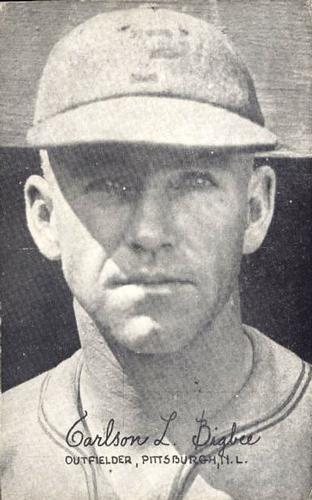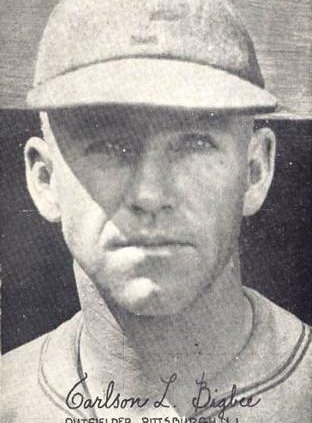June 21, 1922: Carson Bigbee’s big day busted by boots
 It takes a great deal of effort to secure 25 hits in a baseball game and manage to lose it. In the case of the Pittsburgh Pirates in their game in Brooklyn on the damp afternoon of June 21, 1922, it was a poor defensive effort that contributed to their demise at the hands of the Robins, who managed “only” 19 hits, blew three separate leads, and gave up eight runs in the final three innings, and still secured the victory. According to Edward Balinger of the Pittsburgh Post, “It was more like taffy pulling (than baseball). Each side seemed to vie with the other to see which could gum up the most plays.”1
It takes a great deal of effort to secure 25 hits in a baseball game and manage to lose it. In the case of the Pittsburgh Pirates in their game in Brooklyn on the damp afternoon of June 21, 1922, it was a poor defensive effort that contributed to their demise at the hands of the Robins, who managed “only” 19 hits, blew three separate leads, and gave up eight runs in the final three innings, and still secured the victory. According to Edward Balinger of the Pittsburgh Post, “It was more like taffy pulling (than baseball). Each side seemed to vie with the other to see which could gum up the most plays.”1
The Pirates started Hal Carlson to face the Robins on this day. Carlson’s last start did not instill confidence in manager George Gibson: He had surrendered seven runs in 3⅓ innings across town at the Polo Grounds against the New York Giants. Robins skipper Wilbert Robinson chose Leon Cadore to face the Pirates. Cadore had lost his last start as well, a 4-2 10-inning loss on June 15 to the St. Louis Cardinals. Cadore, best known for pitching 26 innings on May 1, 1920, against the Boston Braves, had a 4.98 ERA entering the game. The game on this day would not help that statistic.2
The Pirates got to Cadore for a run in the first inning with singles by Rabbit Maranville, Carson Bigbee, and Clyde Barnhart scoring Maranville for a lead that lasted a half-inning. In the Robins’ first, singles by Jimmy Johnston, Zack Wheat, Hi Myers, and Clarence Mitchell gave the Robins a 2-1 lead, which was also short-lived. In the second inning, three singles and a double by Bigbee gave the Pirates a 4-2 lead. Bigbee was in the middle of what was perhaps his best major-league season; he entered the game hitting .359 and had hit safely in 14 of his last 17 games.3
In the Robins’ second, Carlson, perhaps undone due to a trip around the basepaths in the top half of the inning, allowed a double to Hank DeBerry and walked Cadore. Gibson brought in Johnny Morrison to replace Carlson. Andy High greeted Morrison with a bunt that he beat out when Barnhart fell trying to field it, loading the bases. Johnston’s fielder’s choice scored DeBerry, and Tommy Griffith tied the game with a slow single to short that Pie Traynor threw away, Cadore scoring. Wheat’s groundout scored Johnston, giving Brooklyn back the lead at 5-4.
Cadore started his next inning after scoring in the same manner as Carlson, allowing a double to Traynor and a walk to Ray Rohwer, but he got out of the inning unscathed. The Robins continued to score in the third. Mitchell led off the frame with a single, DeBerry tripled Mitchell home, and Cadore’s single scored DeBerry to jump the Robins’ advantage to 7-4.
Robinson’s men would be excused for thinking that they were in good shape for a victory – Cadore threw the first one-two-three inning of the game in the top of the fourth, and the team increased its lead in the bottom half. Griffith led off the inning with a single but was forced at second on Wheat’s grounder. Then came consecutive singles by Myers, Mitchell, and Ivy Olson and a 9-4 advantage. Cadore’s streak of five consecutive outs was shattered in the top of the fifth with consecutive singles by Bigbee (hit number three) and Barnhart. Traynor popped to second, but Rohwer walked to load the bases. Charlie Grimm‘s sacrifice fly scored Bigbee and Johnny Gooch‘s single scored Barnhart, and the Pirates had trimmed their deficit to 9-6. Gibson brought in Earl Hamilton to keep the Bucs in the game and he gave the Pirates their first one-two-three inning in the bottom of the fifth.
If the fielding gods had been holding things together to that point, they started to falter in the sixth. Hall fumbled a groundball off Maranville’s bat to start the sixth, but Cadore was able to pitch around that. Hamilton was not as lucky. Wheat walked with one out and moved to second when Traynor fumbled Myers’ grounder. After Mitchell’s popup, Olson singled to plate Wheat and push the Robins’ lead back to 10-6. Traynor made his second error of the inning (and third of the game) when he dropped DeBerry’s grounder to load the bases, but was able to handle Cadore’s bouncer to force DeBerry and end the inning.
The seventh inning was the only one of the game in which neither team scored, but any boredom felt by the estimated 3,500 spectators after that was abated by what followed. Cadore retired the first two hitters on groundouts, but Max Carey‘s single and Bigbee’s fourth hit of the game, a double to right, put two runners in scoring position, and Barnhart’s single put two runs across the plate and Cadore in the dugout. Uncle Robbie brought in Al Mamaux to preserve the lead, but his stay was short: He allowed singles to Traynor and Rohwer that scored Barnhart. Robbie then tried to end the rally with Sherry Smith, but Smith allowed a game-tying single to Grimm, it was 10-10,and the Pirates had back. Chief Yellow Horse was able to keep the Robins at bay in the bottom of the eighth, and so the chaos would continue.
Smith’s ninth inning started innocently enough. He retired the first two Pirates, but Carey singled, Bigbee tripled (hit number 5), Barnhart singled, and the Pirates had their first lead since the second inning, 12-10. It could have been worse, but Barnhart was thrown out at third trying to advance on Traynor’s single. Robinson’s men, now needing two to tie the game, started strongly with Bert Griffith‘s pinch-hit double off Chief Yellow Horse, but he was thrown out trying to go to third on Dutch Ruether‘s bunt. Johnson’s single put the tying runs on and Yellow Horse on the bench, as Gibson brought in the veteran Babe Adams to save the game. Adams could not, allowing a double to Tommy Griffith that scored Bernie Neis, running for Ruether, then intentionally walked Wheat to load the bases. The strategy nearly worked, but Myers’ fly ball sent Johnston home to tie the game again and send it to extra innings.
Robinson brought in Burleigh Grimes to slow the resurgent Pirate bats, but Rohwer had other ideas, launching a shot to right, the only home run of the game, to give the lead back to the Pirates. Grimes gave the Pirates an insurance run when his wild pitch allowed Gooch, who had singled and moved to third on an Adams single and Maranville groundout, to score. In the bottom of the inning, Adams had a chance to close out the game that Yellow Horse couldn’t an inning earlier, but by now the fielding gods had completely given up. Olson launched a long fly to right that Rohwer had in his glove, but the force of hitting the wall dislodged the ball and Olson got to second. Otto Miller then reached on an error by third baseman Barnhart, with Olsen staying at second. Grimes, the next batter, bunted. Adams tried to force Olson at third. His throw instead evaded Barnhart and went down the third-base line. Bigbee retrieved the ball and tried to throw out Miller, but his throw was cut off by Adams, whose relay to Gooch instead found the Brooklyn dugout and the game was tied again. Grimes, who had continued his run down the first-base line unaware of what was happening, was awarded third. Consecutive walks to Hal Janvrin and Johnston set up a force at any base, but Tommy Griffith found the outfield with a long fly to Rohwer, who had no chance to throw out Grimes.
The win elevated the Robins to third place ahead of the Pirates, who perhaps traveled back to Pittsburgh contemplating what could have been a great come-from-behind victory. Instead, the Robins had secured one of the wilder games of 1922.
SOURCES
In addition to the sources listed in the Notes, the author accessed Retrosheet.org and Baseball-Reference.com, as well as the Brooklyn Daily Eagle, the Pittsburgh Gazette, and the Pittsburgh Post at newspapers.com.
NOTES
1 Edward F. Balinger, “Bucs Lose to Dodgers in Weird Game, 15-14, Drop to Fourth Place,” Pittsburgh Post, June 22, 1922: 10.
2 Cadore was 42-40 with a 2.99 ERA during the 1919-1921 seasons but entering this game his record sat at just 2-4 with an ERA of 4.98.
3 Bigbee would be known better for his scoring the winning run in the 1925 World Series for the Pirates, and for being the first player to have 11 at-bats in one major-league game. The second time a batter had 11 at-bats in a game was in the game Cadore threw on May 1, 1920.
Additional Stats
Brooklyn Robins 15
Pittsburgh Pirates 14
10 innings
Ebbets Field
Brooklyn, NY
Box Score + PBP:
Corrections? Additions?
If you can help us improve this game story, contact us.


